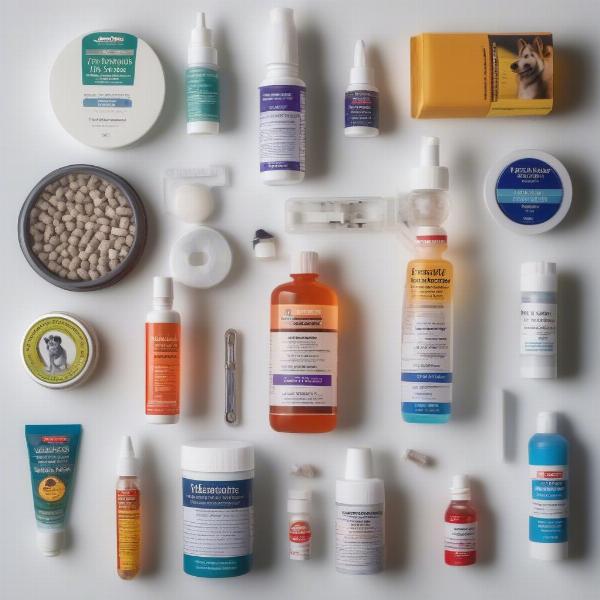Choosing the right flea and tick medication for your dog can feel overwhelming. With so many options available, from topical treatments to oral medications and collars, it’s crucial to understand the differences and select the best protection for your furry friend. This guide will cover everything you need to know about flea and tick meds for dogs, ensuring your canine companion stays happy, healthy, and parasite-free.
 Choosing effective flea and tick medication for dogs
Choosing effective flea and tick medication for dogs
Understanding the Importance of Flea and Tick Prevention
Fleas and ticks aren’t just annoying pests; they can transmit serious diseases to your dog. Lyme disease, ehrlichiosis, and Rocky Mountain spotted fever are just a few examples of the illnesses these parasites can carry. Preventing infestations is far easier and safer than treating an established infestation and potential diseases.
Types of Flea and Tick Meds for Dogs
Several types of flea and tick medications are available, each with its own advantages and disadvantages. Choosing the right one depends on your dog’s lifestyle, age, health, and any potential allergies.
Topical Treatments
Topical treatments are applied directly to your dog’s skin, usually on the back of the neck. They work by spreading through the skin and killing fleas and ticks on contact.
Oral Medications
Oral medications are given by mouth, typically as a chewable tablet or pill. These medications work systemically, killing fleas and ticks when they bite your dog.
Flea and Tick Collars
Flea and tick collars are worn around your dog’s neck and release medication that kills and repels parasites. Some collars offer protection for several months.
Choosing the Right Flea and Tick Med for Your Dog
What’s the best flea and tick preventative for your dog? Consider your dog’s specific needs. If your dog swims frequently, a waterproof topical treatment or oral medication may be a better choice than a collar. For dogs with sensitive skin, certain topical treatments might cause irritation, so oral medications or hypoallergenic options might be preferable.
Considering Your Dog’s Age and Health
Puppies and senior dogs may require different medications than adult dogs. Always check the product label to ensure it’s safe for your dog’s age and health status. If your dog has any underlying health conditions, consult your veterinarian before starting any new flea and tick medication.
Administering Flea and Tick Medication Safely
Always follow the manufacturer’s instructions carefully when applying or administering flea and tick medication. Avoid contact with your dog’s eyes and mouth, and wash your hands thoroughly after application.
What if My Dog Still Gets Fleas or Ticks?
Even with preventative measures, your dog might still pick up a flea or tick. If you find a tick on your dog, remove it promptly using tweezers, grasping it close to the skin and pulling straight out. If you notice signs of a flea infestation, such as excessive scratching, consult your veterinarian for treatment options.
Conclusion
Protecting your dog from fleas and ticks is essential for their health and well-being. By understanding the different types of flea and tick meds available and considering your dog’s individual needs, you can choose the best preventative to keep your canine companion happy and parasite-free. Regular preventative treatment is key to ensuring your dog’s continued health.
FAQ
- How often should I apply flea and tick medication to my dog? Most medications need to be applied monthly, but always follow the manufacturer’s instructions.
- Are flea and tick medications safe for pregnant or nursing dogs? Consult your veterinarian before using any flea and tick medication on pregnant or nursing dogs.
- Can I use cat flea and tick medication on my dog? No, never use cat flea and tick medication on a dog, as it can be toxic.
- What are the signs of a flea or tick infestation? Excessive scratching, biting at the skin, hair loss, and small black specks (flea dirt) in the fur.
- What should I do if my dog has an allergic reaction to flea and tick medication? Contact your veterinarian immediately.
- Are natural flea and tick remedies effective? While some natural remedies may offer some repellent properties, they are often not as effective as conventional medications. Consult with your vet before trying any natural remedies.
- How can I keep my yard free of fleas and ticks? Regularly mow your lawn, remove leaf litter, and consider using yard sprays specifically designed to control fleas and ticks.
About ILM Dog
ILM Dog is your trusted international resource for all things dog-related. We offer expert advice on dog breeds, health care, training, nutrition, grooming, and much more. Whether you’re a seasoned dog owner or just starting your journey, ILM Dog provides practical, reliable information to help you give your furry friend the best possible care. For any inquiries, contact us at [email protected] or call us at +44 20-3965-8624.